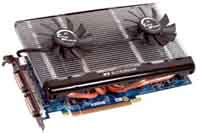 by congo » Sat Sep 02, 2006 6:32 pm
by congo » Sat Sep 02, 2006 6:32 pm
It can be a tad deep, until you get the hang of the basics, I'm sorry I wasn't clear.
Most overclocking articles deal with how to get maximum settings, ie. max FSB, max CPU, and max memory speeds. It's then a matter of combining the settings in an attempt to get the best stable compromise.
Read as much as you can and experiment a lot with your PC, make BIOS your friend, and don't hesitate to ask if you have a question, but ask one question at a time, so the info sinks in, it can be confusing to try to resolve several issues at once.
As far as me saying I thought 1.5v vcore was high, it's not really a high or potentially damaging voltage by itself, It's generally accepted that 1.6v-1.65v vcore and above is in the realm of PC's with water cooling or some other cooling solution than air.
When you see CPU full load temps going up through 60* suddenly after a vcore increase, you know it's time to back off. When your CPU hits that limit, depends on your PC and it's cooling solution, furthermore, addtional expensive cooling may not get you much further anyway.
I tend to be conservative when I advise on other people's overclocks. I try to get them a significant increase in performance without pushing the limits of their hardware, so not to stress the rig excessively. SO, I try to keep Vcore as close to stock as possible unless it's evident that more vcore is required, and that no significant temp rises are occurring.
Cheers.
Last edited by
congo on Sat Sep 02, 2006 6:46 pm, edited 1 time in total.

Mainboard: Asus P5K-Premium, CPU=Intel E6850 @ x8x450fsb 3.6ghz, RAM: 4gb PC8500 Team Dark, Video: NV8800GT, HDD: 2x1Tb Samsung F3 RAID-0 + 1Tb F3, PSU: Antec 550 Basiq, OS: Win7x64, Display: 24&




 Mainboard: Asus P5K-Premium, CPU=Intel E6850 @ x8x450fsb 3.6ghz, RAM: 4gb PC8500 Team Dark, Video: NV8800GT, HDD: 2x1Tb Samsung F3 RAID-0 + 1Tb F3, PSU: Antec 550 Basiq, OS: Win7x64, Display: 24&
Mainboard: Asus P5K-Premium, CPU=Intel E6850 @ x8x450fsb 3.6ghz, RAM: 4gb PC8500 Team Dark, Video: NV8800GT, HDD: 2x1Tb Samsung F3 RAID-0 + 1Tb F3, PSU: Antec 550 Basiq, OS: Win7x64, Display: 24&
